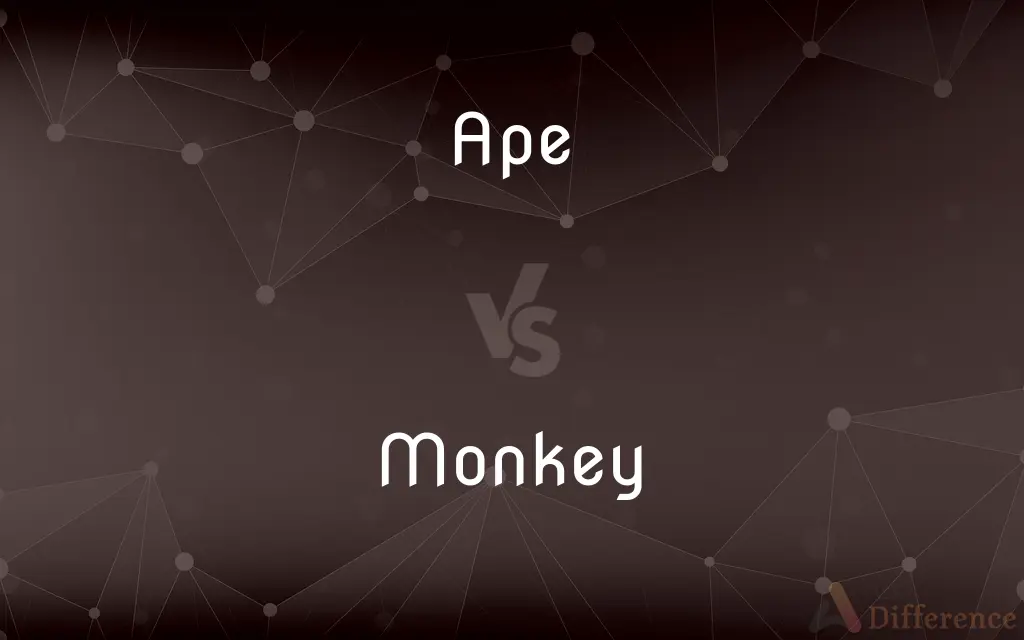Ape vs. Monkey — What's the Difference?
By Tayyaba Rehman — Updated on September 23, 2023
Apes are tailless primates with larger brains, while monkeys typically have tails and smaller brains.

Difference Between Ape and Monkey
Table of Contents
ADVERTISEMENT
Key Differences
Apes and Monkeys, though both primates, have distinguishing features and evolutionary histories. The most noticeable difference between an Ape and a Monkey is the presence or absence of a tail. Monkeys typically have tails, which can be prehensile in some species, allowing them to grasp and swing from branches. Apes, on the other hand, lack tails entirely and rely more on their arm strength for brachiation.
When observing their sizes, Apes are generally larger and have a more robust build than Monkeys. This difference in size can also extend to their brains, with Apes boasting larger and more complex brains. This larger brain size is often associated with the higher cognitive abilities displayed by Apes, like problem-solving and tool use. Monkeys, while intelligent, don't demonstrate the same level of cognitive complexity.
Another distinction between Apes and Monkeys is their locomotion. Apes have a more upright posture and broader chests, enabling them to move using both their legs and arms (knuckle-walking). Monkeys usually have a more quadrupedal movement, relying primarily on all four limbs.
Habitat and distribution also vary between Apes and Monkeys. While both can be found in tropical and subtropical regions, Monkeys are more diverse in habitat, found in both Old World and New World locations. Apes are limited to the Old World, predominantly in Africa and parts of Asia.
Comparison Chart
Tail
No tail
Typically have tails
ADVERTISEMENT
Size & Brain
Larger size and more complex brain
Smaller size and simpler brain
Locomotion
More upright, often knuckle-walking
Mostly quadrupedal
Cognitive Abilities
Advanced problem-solving and tool use
Less cognitive complexity
Distribution
Found in the Old World
Found in both Old World and New World
Compare with Definitions
Ape
A tailless primate.
The gorilla is the largest living Ape.
Monkey
Known for their playful and curious nature.
The Monkey was fascinated by the tourist's camera.
Ape
Includes species like gorillas, chimpanzees, and orangutans.
The bonobo is an Ape closely related to humans.
Monkey
Often smaller than apes with a more quadrupedal movement.
The Monkey scampered across the forest floor searching for food.
Ape
Known for complex cognitive abilities.
The Ape used a stick to extract termites from a mound.
Monkey
Monkey is a common name that may refer to certain groups or species of simian mammals of infraorder Simiiformes. The term is applied descriptively to groups of primates, such as families of New World monkeys and Old World monkeys.
Ape
Has a more upright posture than most primates.
The Ape stood tall, observing its surroundings.
Monkey
Any of various tailed primates of the suborder Anthropoidea, including the macaques, baboons, capuchins, and marmosets, and excluding the apes.
Ape
Primarily found in Africa and parts of Asia.
The Ape habitat is threatened by deforestation.
Monkey
A nonhuman ape. Not in scientific use.
Ape
Apes (Hominoidea ) are a branch of Old World tailless simians native to Africa and Southeast Asia. They are the sister group of the Old World monkeys, together forming the catarrhine clade.
Monkey
One who behaves in a way suggestive of a monkey, as a mischievous child or a mimic.
Ape
A large primate that lacks a tail, including the gorilla, chimpanzees, orangutan, and gibbons.
Monkey
The iron block of a pile driver.
Ape
An unintelligent or clumsy person.
Monkey
(Slang) A person who is mocked, duped, or made to appear a fool
They made a monkey out of him.
Ape
An inferior imitator or mimic
Cunning is but the ape of wisdom
Monkey
Offensive Slang Used as a disparaging term for a person with dark skin.
Ape
Imitate (someone or something), especially in an absurd or unthinking way
New architecture can respect the old without aping its style
Monkey
To play, fiddle, trifle, or tamper with something
Who was monkeying with my phone?.
Ape
Any of various tailless Old World primates of the superfamily Hominoidea, including the gibbons, orangutans, gorillas, chimpanzees, and humans.
Monkey
To behave in a mischievous or apish manner
Stop monkeying around!.
Ape
Any of various members of this superfamily bearing fur and usually living in the wild, especially orangutans, gorillas, and chimpanzees, in contrast to humans. Not in scientific use.
Monkey
To imitate or mimic; ape.
Ape
A tailed primate such as a monkey. Not in scientific use.
Monkey
(properly) A member of the clade Simiiformes other than those in the clade Hominoidea containing humans and apes, generally (but not universally) distinguished by small size, tails, and cheek pouches.
He had been visiting an area zoo when a monkey swung from its tree perch, swiped his glasses and hurled them into a hippo hole.
Ape
A mimic or imitator.
Monkey
Any simian primate other than hominids, any monkey or ape.
Chimpanzees are known to form bands to hunt and kill other monkeys.
Ape
(Informal) A clumsy or boorish person.
Monkey
A human considered to resemble monkeys in some way, including:
Ape
To imitate or mimic, especially in a thoughtless or inept way.
Monkey
A naughty or mischievous person, especially a child.
Stop misbehaving, you cheeky little monkey!
Ape
A primate of the clade Hominoidea, generally larger than monkeys and distinguished from them by having no tail.
Monkey
(slang) The person in the motorcycle sidecar in sidecar racing.
Ape
Any such primate other than a human.
Monkey
(pejorative) idiot: a person of minimal intelligence.
Ape
(derogatory) An uncivilized person.
Monkey
(pejorative) uggo: an unattractive person, especially one whose face supposedly resembles a monkey's.
Ape
One who apes; a foolish imitator.
Monkey
Synonym of puppet: a person dancing to another's tune, a person controlled or directed by another.
No, no, no, not you. I want to talk to the organ grinder, not the monkey.
Ape
(intransitive) To behave like an ape.
Monkey
A menial employee who does a repetitive job supposedly requiring minimal intelligence.
Code monkey... grease monkey... phone monkey... powder monkey...
Ape
(transitive) To imitate or mimic, particularly to imitate poorly.
Monkey
A black, a black person.
Ape
(slang) Wild; crazy.
We were ape over the new look.
He went ape when he heard the bad news.
Monkey
(historical) A small trading vessel of the sixteenth century.
Ape
A quadrumanous mammal, esp. of the family Simiadæ, having teeth of the same number and form as in man, and possessing neither a tail nor cheek pouches. The name is applied esp. to species of the genus Hylobates, and is sometimes used as a general term for all Quadrumana. The higher forms, the gorilla, chimpanzee, and ourang, are often called anthropoid apes or man apes.
Monkey
The vessel in which a mess receives its full allowance of grog.
Ape
One who imitates servilely (in allusion to the manners of the ape); a mimic.
Monkey
The weight of a pile driver or drop hammer.
Ape
A dupe.
Monkey
A fluid consisting of hydrochloric acid and zinc, used in the process of soldering.
Ape
To mimic, as an ape imitates human actions; to imitate or follow servilely or irrationally.
The people of England will not ape the fashions they have never tried.
Monkey
(slang) five hundred, especially (British) 500 pounds sterling or 500 dollars.
Ape
Any of various primates with short tails or no tail at all
Monkey
(blackjack) face card.
Ape
Someone who copies the words or behavior of another
Monkey
(slang) A person's temper, said to be "up" when they are angry.
Ape
Person who resembles a non-human primate
Monkey
(slang) A drug habit; an addiction; a compulsion.
Everybody's got something to hide except for me and my monkey.
Ape
Imitate uncritically and in every aspect;
Her little brother apes her behavior
Monkey
(dance) A dance popularized by Major Lance in 1963, now usually only its upper-body dance move involving exaggerated drumming motions.
Ape
Represent in or produce a caricature of;
The drawing caricatured the President
Monkey
To meddle; to mess (with).
Please don't monkey with the controls if you don't know what you're doing.
Monkey
(transitive) To mimic; to ape.
Monkey
In the most general sense, any one of the Quadrumana, including apes, baboons, and lemurs.
Monkey
A term of disapproval, ridicule, or contempt, as for a mischievous child.
This is the monkey's own giving out; she is persuaded I will marry her.
Monkey
The weight or hammer of a pile driver, that is, a very heavy mass of iron, which, being raised on high, falls on the head of the pile, and drives it into the earth; the falling weight of a drop hammer used in forging.
Monkey
A small trading vessel of the sixteenth century.
Monkey
To act or treat as a monkey does; to ape; to act in a grotesque or meddlesome manner.
Monkey
Any of various long-tailed primates (excluding the prosimians)
Monkey
One who is playfully mischievous
Monkey
Play around with or alter or falsify, usually secretively or dishonestly;
Someone tampered with the documents on my desk
The reporter fiddle with the facts
Monkey
Do random, unplanned work or activities or spend time idly;
The old lady is usually mucking about in her little house
Monkey
A primate typically with a tail.
The Monkey swung energetically from branch to branch.
Monkey
Exists in both New World and Old World varieties.
The capuchin is a New World Monkey, while the macaque is an Old World Monkey.
Monkey
Some species have prehensile tails.
The Monkey used its tail to grasp a fruit.
Common Curiosities
Do Apes have tails?
No, Apes are tailless, whereas Monkeys typically have tails.
Which is larger, an Ape or a Monkey?
Apes are generally larger than Monkeys.
Where are Monkeys found geographically?
Monkeys can be found in both Old World and New World regions.
Are Apes more intelligent than Monkeys?
Apes have more complex brains and demonstrate higher cognitive abilities than Monkeys.
What are some examples of Apes?
Gorillas, chimpanzees, bonobos, and orangutans are all examples of Apes.
Which primate is known for using tools?
While both can use tools, Apes are more renowned for their advanced tool use and problem-solving.
Are humans considered Apes?
Yes, humans are biologically classified as Apes.
Do Monkeys and Apes belong to the same primate family?
No, they belong to different families, with Apes being more closely related to humans.
Why do Apes have a more upright posture?
Apes have broader chests and a skeletal structure that supports a more upright posture than Monkeys.
Are all Apes endangered?
Many Ape species are threatened or endangered, mainly due to habitat loss.
Do all Monkeys have prehensile tails?
No, only certain species of New World Monkeys have prehensile tails.
Do both Apes and Monkeys live in social groups?
Yes, both Apes and Monkeys tend to be social animals, living in groups or troops.
Which has a more varied habitat, the Ape or the Monkey?
Monkeys have a more diverse habitat, found in various parts of the world.
How do Monkeys communicate?
Monkeys use vocalizations, gestures, and facial expressions for communication.
What's the primary difference in their locomotion?
Apes are often knuckle-walkers, while Monkeys typically move quadrupedally.
Share Your Discovery

Previous Comparison
Pyrite vs. Chalcopyrite
Next Comparison
Wedding vs. MarriageAuthor Spotlight
Written by
Tayyaba RehmanTayyaba Rehman is a distinguished writer, currently serving as a primary contributor to askdifference.com. As a researcher in semantics and etymology, Tayyaba's passion for the complexity of languages and their distinctions has found a perfect home on the platform. Tayyaba delves into the intricacies of language, distinguishing between commonly confused words and phrases, thereby providing clarity for readers worldwide.
















































